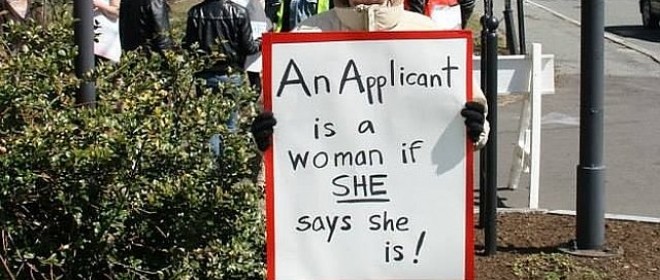
Gender is not a new topic on college campuses. There are Gender Studies classes, programs, and majors on many. And students, faculty, and administrators alike have been discussing, arguing about, and protesting policies and non-policies that are related to the gender of students for decades. In just the last few years, college after college and university after university have fallen under the shadow of reports of horrifically poor responses to students who were raped on campus by fellow students. Discussions of “rape culture” and female students’ rights under Title IX have naturally arisen.
No doubt discussions of gender on single-sex campuses, particularly the nearly 50 remaining all-female colleges, likely arise with some regularity. Those who choose to attend an all-women’s college do so for a variety of reasons—some deeply personal, others having to do with academic concerns when men are in the classroom. But those who do so likely have made a conscious choice that they want to live and learn with other women. Thus, a current debate regarding the admission (or, more accurately, the non-admission) of transgender students to all-women colleges is an interesting and important one.
In March 2013, Smith College, in Northampton, MA, declined admission to Calliope Wong, a transgender woman.* According to a New York Times article by Kiera Feldman, the Smith letter of rejection said, in part:
“Smith is a women’s college, which means that undergraduate applicants to Smith must be female at the time of admission….Your [Free Application for Federal Student Aid] indicates your gender as male. Therefore, Smith cannot process your application.”
This April, after trying to work with administrators to change the admissions policy regarding transgender women, some Smith College students, along with others who supported their cause, protested—organized by a group calling themselves “Q&A.” When they met with Smith administrators, it was explained to them that the college only accepts women, and that there needs to be a way to define what a woman is. It is not that they do not accept transgender women or that they deny that such individuals are women; it is, according to their policy, that “Smith expects that, to be eligible for review, a student’s application and supporting documentation (transcripts, recommendations, etc.) will reflect her status as a woman.”**
The problem is that many students do not attend a high school that is supportive surrounding this issue and, thus, these individuals will not be able to have their documents reflect their true gender. Thus, Smith is, indeed, effectively denying admission to a significant number of transgender women. It seems clear to me that Smith needs to explore what they are really concerned about and then draft a new policy that reflects the reality of a small liberal arts college, in a very liberal area of the country, in 2014. There is no doubt in my mind that they will ultimately have to make the decision to accept any individual who self-defines as a woman.
There are many issues to be thought through regarding transgender students. For instance, some current Smith students are transgender men—that is, they presumably transitioned some time after their admittance. If the concern of such colleges is that they provide a safe, supportive, single-sex education, how do they reconcile that with their desire to accommodate the diverse needs of their student body? Further, while the vocal group currently consists of those who are angry that transgender women are often rejected for reasons they deem unfair, what will the school’s answer be to those who protest that they do not want to be at school with those who may have lived their life to this point as boys and, thus, do not understand what it means to be a girl/woman in our society. (I have several answers to that, if school administrators are interested.)
(It is worth noting, by the way, that Smith College—along with Mount Holyoke—is part of the five-college system with Amherst College, Hampshire College, and the University of Massachusetts at Amherst, all of which are coed institutions. So men are presumably welcome to take classes at Smith and Mount Holyoke. There are also male faculty, administrators, and support staff always on those campuses.)
On a final note, in the same NY Times opinion piece, Feldman quotes the President of Mount Holyoke, Lynn Pasquerella, as saying the following:
“What would prevent the male child of a faculty member who gets a tuition break for getting admitted from saying, ‘Well, I identify as female, so I want to go here and get a free education’?”
This response would be laughable if it weren’t so disappointing coming from the head of an institution that considers itself progressive. Can she really imagine such a scenario—other than in a sitcom or a romantic comedy? And what will happen when that young man graduates college and wants to go on to graduate school or apply for a job? Will he have to claim to be a transgender man who transitioned in college or soon after? Perhaps a more relevant question would be, “What would stop a transgender man who is the child of a faculty member from applying to an all-women’s college because his supporting documents state that he is a boy?”
*A woman who was assigned at birth, based on anatomy, as a boy, but who is, in fact, a girl/woman. “Cisgender” refers to individuals whose assignment at birth matches their sex and gender.
**Smith changed the policy so that only those documents related to admission would be used in this regard.




